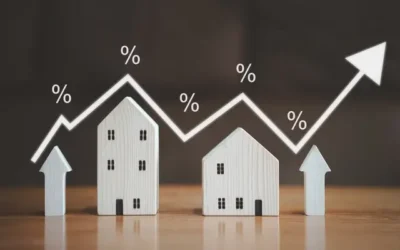Navigating the ever-changing world of mortgage rates can feel overwhelming, especially if you’re a Veteran planning to buy or refinance your home in 2026.
With rates influenced by various economic factors, understanding what lies ahead is crucial to making informed decisions.
This article dives deep into the forecast for mortgage rates in 2026, highlights implications for Veterans, and provides actionable steps to plan effectively.
Understanding the Current Mortgage Landscape
As of late 2026, mortgage rates have been on a rollercoaster, influenced by Federal Reserve policies, inflation, and global economic conditions. Fixed-rate mortgages hover between 6% and 7%, while adjustable-rate mortgages (ARMs) have remained slightly lower, offering initial rates around 5.5%.
For Veterans, VA loans continue to provide some of the most competitive rates in the market, thanks to their government-backed benefits.
"VA loans remain an excellent choice for Veterans in 2026," says Michael Norton, a mortgage consultant. "They often come with no down payment and competitive rates, making homeownership more accessible."
2026 Mortgage Rate Predictions
Several economic indicators suggest moderate fluctuations in mortgage rates for 2026. Here’s what experts predict:
- Federal Reserve Actions:
- The Fed's interest rate hikes in 2026 aimed to combat inflation, but they may stabilize or even ease in 2026 if inflation shows signs of cooling.
- Economic Growth:
- Moderate GDP growth could lead to steady mortgage rates, maintaining a range similar to late 2026 levels.
- Global Market Influences:
- Economic events, such as shifts in oil prices or geopolitical tensions, could indirectly impact U.S. mortgage rates.
Fixed-Rate vs. Adjustable-Rate Mortgages in 2026
Choosing between a fixed-rate mortgage (FRM) and an ARM is a significant decision for Veterans. Understanding how 2026’s rate trends impact each option can help clarify your choice.
Fixed-Rate Mortgages
- Best for Long-Term Stability: Locking in a fixed rate ensures predictable monthly payments, ideal for those planning to stay in their home long-term.
- Current Outlook: Rates may remain slightly elevated compared to ARMs, but the security they offer appeals to risk-averse borrowers.
Adjustable-Rate Mortgages
- Best for Flexibility: ARMs offer lower initial rates, making them attractive for short-term homeowners.
- Current Outlook: With initial rates likely 1-2% lower than fixed options, ARMs could save Veterans money if they plan to move or refinance before adjustments kick in.
| Mortgage Type | Average Rate | Best For |
|---|---|---|
| Fixed-Rate | 6.5% | Long-term stability and predictability |
| Adjustable-Rate | 5.3% (initial) | Short-term savings and lower initial costs |
How Economic Factors Affect Veterans' Mortgage Options
Veterans benefit from VA loans, which shield them from many traditional financial hurdles. However, understanding how economic trends impact VA loans is essential.
- Rate Caps on VA Loans:
- While VA loans typically offer lower rates, market fluctuations still play a role. If the Federal Reserve continues to ease monetary policies, VA rates may remain favorable.
- Loan Limits and Entitlement:
- In 2026, VA loan limits will likely align with FHFA guidelines, allowing Veterans to borrow more without a down payment in high-cost areas.
- Market Competition:
- With limited housing inventory, competitive offers remain crucial. Veterans should consider pre-approval to stand out in the bidding process.
Tips for Veterans Preparing for 2026 Mortgages
Preparing for mortgage decisions in 2026 requires proactive steps. Here are practical tips tailored for Veterans:
- Monitor Rates Regularly: Keep an eye on economic news and mortgage rate updates to identify favorable windows for locking in rates.
- Get Pre-Approved: VA loan pre-approval can strengthen your position as a buyer, signaling seriousness to sellers.
- Work with VA-Savvy Lenders: Choose lenders experienced with VA loans to maximize benefits and navigate the process efficiently.
- Consider Refinancing: If rates drop significantly, refinancing your existing mortgage can lower monthly payments and save money.
Challenges Veterans May Face in 2026
While VA loans provide significant benefits, Veterans may encounter challenges in the 2026 housing market. Awareness of these potential hurdles can help Veterans prepare and navigate the process with confidence.
Housing Inventory
A tight housing market is expected to persist, with limited home availability leading to increased competition. Veterans may face:
- Bidding Wars: High demand could drive up offers, making it harder to secure a property.
- Compromised Options: Veterans may need to adjust preferences for location, size, or features.
- Longer Home Searches: Finding the right home may take more time due to low inventory.
Rising Home Prices
Climbing home prices, driven by demand outpacing supply, may create budgetary challenges:
- Higher Costs: Veterans may need to reassess their budgets to accommodate higher prices.
- Larger Loans: Rising prices could lead to increased monthly payments.
- Appraisal Issues: Higher market prices might not align with VA appraisals, complicating negotiations.
Credit Score Requirements
Maintaining a strong credit score remains essential, even with VA loan flexibility. Challenges include:
- Post-Pandemic Recovery: Financial setbacks may still impact some Veterans’ credit profiles.
- Impact on Rates: A lower credit score could lead to higher interest rates, increasing overall loan costs.
Economic and Regional Challenges
Economic uncertainty and regional disparities could affect affordability:
- Interest Rate Volatility: Rates may fluctuate, impacting loan affordability.
- Regional Markets: Hot markets like Texas and California may see heightened competition, while rural areas might lack VA-approved properties.
Preparation Is Key
Veterans can take proactive steps to overcome these challenges:
- Get Pre-Approved: Early pre-approval helps in competitive markets.
- Save for Extras: Extra savings can cover appraisal gaps or additional costs.
- Work with Experts: Partnering with VA-savvy agents and lenders ensures smoother transactions.
With planning and awareness, Veterans can confidently navigate these challenges and achieve their homeownership goals in 2026.
Expert Advice for Veterans
To provide clarity, we spoke with financial and mortgage experts about Veterans' prospects in 2026:
- "Veterans should leverage their VA benefits to the fullest. The no-down-payment option remains a game-changer," advises Susan Keller, a mortgage broker specializing in VA loans.
- "Don't overlook ARMs if you're buying a starter home. The lower initial rates can help you save, but plan for rate adjustments," adds John Peterson, a financial planner.
- "Preparation is key. Knowing your financial limits and securing pre-approval will make your home-buying process smoother," notes Emma Wright, a real estate consultant.
Frequently Asked Questions
How are VA mortgage rates different from conventional loans?
VA loans typically offer lower interest rates than conventional loans because they are government-backed, reducing risk for lenders.
Will 2026 be a good year for Veterans to buy homes?
Yes, but it depends on your financial readiness and market conditions. With favorable VA loan terms, Veterans have an advantage in any market.
Should I choose a fixed-rate or adjustable-rate mortgage?
If you value stability, a fixed-rate mortgage is better. If you plan to move within 5-7 years, an ARM may save you money.
What credit score do I need for a VA loan in 2026?
While VA loans don't have a strict credit score requirement, most lenders prefer scores above 620 to qualify for competitive rates.
Can I refinance my VA loan if rates drop in 2026?
Yes, the VA IRRRL (Interest Rate Reduction Refinance Loan) program makes refinancing simple, often with minimal documentation.
What are the biggest challenges for Veterans in 2026?
Limited housing inventory, rising home prices, and market competition are potential challenges, but VA benefits help offset these obstacles.
How do I qualify for a VA loan?
You must have a Certificate of Eligibility (COE), meet service requirements, and choose a lender experienced with VA loans.
Are there loan limits for VA loans in 2026?
VA loans typically follow FHFA loan limits, but eligible Veterans with full entitlement may borrow without a specific cap.








